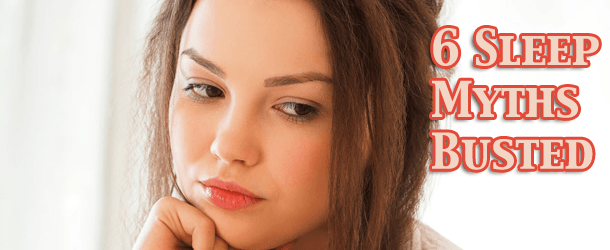
An estimated 50 to 70 million Americans don’t get enough sleep, according to the U.S. Centers for Disease Control and Prevention. Even if you typically do get a good night’s rest, chances are there’s the occasional night–or stretches of nights–where you fall short. To make every last minute of sleep count, don’t abide by these sleep myths:

Myth 1: Falling asleep to the TV is OK.
The Truth: Artificial light from televisions–and especially from computer and smartphone screens–may suppress production of melatonin, a sleep-inducing hormone triggered by darkness. Artificial light also shifts your circadian rhythms, a biological cycle that responds primarily to daylight and darkness and influences sleep.
Myth 2: A glass of wine before bed will help you get a better night’s rest.
The Truth: Because alcohol is a sedative, drinking wine, beer or other alcoholic beverages may help you fall asleep, but as little as two drinks can cause you to sleep less restfully and wake up more frequently. And alcohol-related sleep disturbances are worse for women, say researchers at the University of Michigan. Drink moderately, if at all, and avoid drinking within a few hours of bedtime.
Myth 3: Exercising at night keeps you awake.
The Truth: Hitting the gym or going for a run less than three hours before bedtime won’t prevent you from falling asleep, according to recent research. It may, however, hinder your sleep quality.
Myth 4: A cup of herbal tea will put you to sleep faster.
The Truth: Though chamomile, lemon balm, hops and passionflower are all touted for their sleep-promoting properties (and are often found in “sleep-formula” tea blends), their effectiveness hasn’t been proven in clinical studies, according to the American Academy of Sleep Medicine.
Myth 5: You can catch up on lost sleep by sleeping in on weekends.
The Truth: If you sleep poorly, or don’t get enough sleep, once or twice a week, you can make up for it. But after more than a few sleepless nights, it becomes harder to “recover” from lost sleep, says new research from Penn State University.
Myth 6: Drinking a glass of warm milk will help you fall asleep.
The Truth: The theory is this: milk contains tryptophan (the amino acid best known for being in turkey), which when released into the brain produces serotonin, a serenity-boosting neurotransmitter. But when milk was tested, it failed to affect sleep patterns.
“Tryptophan-containing foods don’t produce the hypnotic effects pure tryptophan does, because other amino acids in those foods compete to get into the brain,” explains Art Spielman, M.D., an insomnia expert and professor of psychology at the City University of New York.
– Brierly Wright, M.S., R.D.
EatingWell is a magazine and website devoted to healthy eating as a way of life. Online at www.eatingwell.com.
(c) 2012 Eating Well, Inc. DISTRIBUTED BY TRIBUNE MEDIA SERVICES, INC.

